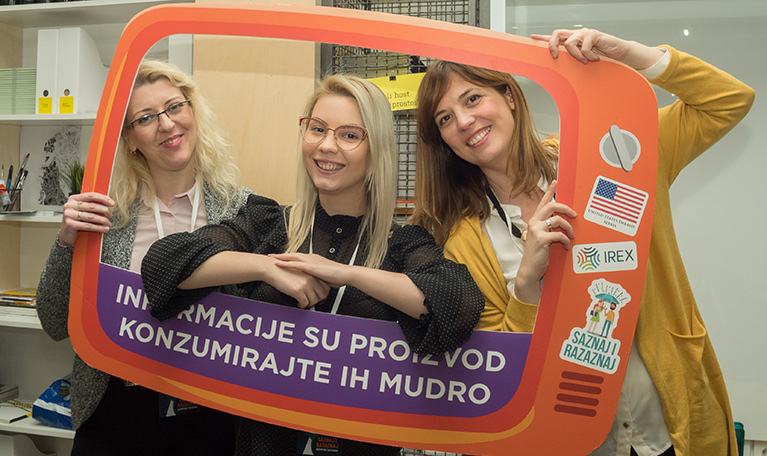Supporting Information Integrity and Resilience

IREX is committed to helping individuals, communities, and organizations protect information integrity and build resilience to manipulative information.
Manipulative information – an umbrella term that encompasses misinformation, malinformation, hate speech, propaganda, etc. – threatens security, public health, civic discourse, community cohesion, and democratic governance. To mitigate the spread and influence of manipulative information, IREX uses a range of resilience-building approaches across multiple facets of society.
IREX supports information integrity and resilience through:
- Training: Empowering citizen resilience to manipulative information
- Campaigns: Creating media and public campaigns to foster media literacy
- Institutional strengthening: Supporting independent media and watchdog groups to produce healthy media environments
- Technology: Codesigning technology solutions to promote information integrity and build resilience
- Advocacy: Advising on policies and regulations to address the threat of manipulative information
- Research: Conducting cutting-edge monitoring, evaluation, and research
Empowering citizen resilience to manipulative information
Resilience to manipulative information is key to creating and maintaining healthy, strong, and vibrant information environments.
Resilience is defined as the ability of an individual, community, institution, or system to successfully manage and adapt to shocks, disruptions, and difficult circumstances and learn from them to mitigate future harm and thrive.
In the context of manipulative information, this means that individuals, organizations, communities, networks, and systems are aware of the threat, can identify manipulative information, take active steps to resist its pull and influence, learn from their experience, and develop proactive measures to prevent future harm and ultimately benefit the groups and individuals operating within that environment.
Learn to Discern (L2D) is IREX’s flagship approach to building media literacy and resilience to manipulative information across the globe. L2D helps people of all ages develop healthy habits for engaging with information, online and offline.
L2D empowers individuals, communities, and organizations to recognize and resist manipulative information and to participate in information spaces without undermining anyone’s dignity or well-being. The program has appeared in numerous outlets, including the New York Times, NPR, Christian Science Monitor, and Journal of Media Literacy Education (PDF, 836 KB).
Recent examples:
- Learn to Discern in Education
- Very Verified and Fighting Misinformation online courses
- Families in the Digital Age
- Media Empowerment for a Democratic Sri Lanka
Creating media and public campaigns to foster media literacy
We create targeted social media campaigns that use "sharable" content—like memes, videos, and quizzes—to win audiences' attention.
Our campaigns draw upon local voices, humor, and compelling graphics to provide quick tips on recognizing manipulative content and encourage responsible sharing, “liking,” and commenting. A randomized control trial found that our social media content is effective at changing behaviors.
Sample programs:
- Advancing Media Literacy in Developing Countries
- Learn to Discern in Education - Ukraine
- CREDIBLE
- YouThink North Macedonia
Supporting independent media and watchdog groups to produce healthy media environments
Information integrity is key to vibrant information ecosystems wherein information serves to help us make better, more inclusive decisions. In a vibrant information ecosystem, people make informed choices—free from manipulation—that improve their lives.
We help journalists produce balanced, informed, and ethical reporting to provide citizens with the information they need to participate in democratic processes and hold leaders accountable. We work with media associations to provide legal assistance to journalists.
We support fact-checking partners to share their findings with wider audiences. We also train media outlets, reporters, bloggers, and citizen journalists to verify information and protect their information channels.
Sample programs:
- Media Empowerment for a Democratic Sri Lanka
- Stabilization through Media Partnerships
- Media for Transparent and Accountable Governance
Codesigning technology solutions to promote information integrity and build resilience
We support locally led strategies to address manipulative information posted online. In Mozambique, we used machine learning and our Media Content Analysis Tool to identify bias in news articles. This type of technology has the potential to strengthen news outlets’ vetting processes at scale.
We are building plug-ins, apps, and other tools that alert users when their data is being harvested for manipulative information campaigns. We partnered with the RAND Corporation to test the effectiveness of a technology solution through a randomized control trial.
Recent experiences:
- Using machine learning to identify bias in news
- Very Verified online courses
- Randomized control trial on effectiveness of memes and videos
Advising on policies and regulations to address the threat of manipulative information
We work with local media lawyers, regulatory bodies, nonprofit organizations, and governments to improve the legal, regulatory, and market environments to support independent media.
By incubating alternative revenue-generation models at the country level and promoting them more broadly, IREX helps to spread ethical practices and locally owned solutions that reduce the need for donors’ resources. This also reduces the influence of political and business groups that “sponsor” media outlets to curtail their editorial freedom.
Sample programs:
Conducting cutting-edge monitoring, evaluation, and research
We are launching the Vibrant Information Barometer, an annual index that tracks the integrity of information environments and how people produce, spread, consume, and use information. This will enable leaders, civil society, media, tech companies, donors, and other organizations to design better approaches to preserve information integrity. This new index will replace the Media Sustainability Index, which we administered around the world for more than 20 years.
We also partner with organizations on research projects. For example, we collaborated with the RAND Corporation to study the effectiveness of using memes and short videos to reduce manipulative information's influence on social media users. We worked with the Law Library of Congress to study how governments have curtailed freedom of expression in more than 20 countries under the guise of promoting quality information about COVID-19.
Examples:
For more information, contact Theo Dolan, IREX's global lead for media and information literacy initiatives, at tdolan@irex.org.